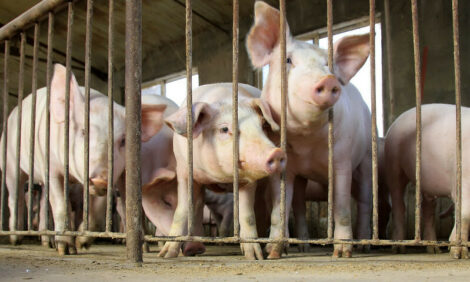



Proposal Signed to Help China Reach Goal of Green Agriculture
CHINA - Leaders from 300 agricultural companies have gathered in Beijing Wednesday to sign a proposal, promising to optimize their production processes and work together to realize China's goal of green agriculture.During the meeting, the Soil and Fertilizer Alliance of China, which is affiliated with the Chinese Academy of Agricultural Sciences, signed a memorandum of cooperation with Alltech, a biotechnology company based in the US. The two parties aim to jointly promote regional farming and breed the integration and the sustainable development of animal husbandry.
They also hope the cooperation will contribute to the goal set by the Ministry of Agriculture, which aims to end the growth of pesticide usage by 2020.
Wang Xu, chairwoman of the Soil and Fertilizer Alliance of China, said China has overlooked soil security and composition for a long time.
"We need to build a good soil ecosystem, which is so important and closely related to our livelihood. In recent years, provinces have been under increasing pressure in dealing with pollutants," she said. "There is no doubt that fertilizers are important. However it is necessary that fertilizers are not overused and do not cause damage to the environment."
"Reutilizing waste, if it could be done in a right way, can increase profits for companies. However if it does not generate profits for farmers, it will not be a sustainable practice," she added.
Mark Lyons, global vice president and head of Greater China for Alltech, said: "We share China's vision, and we also understand the challenges being faced in the field and on the farm by farmers. It is our intention that the conference lights a spark that will enable China's agriculture sector to join together in working toward practical solutions for sustainable farming."
China's No 1 Central Document for 2017 highlighted agriculture, setting goals for the country's sustainable development and environmental protection.
The agriculture sector in China has faced increasing attention and governmental pressure in recent years, as more stringent laws and regulations have been implemented to address concerns regarding the security and safety of the food supply, as well as the environmental impact of farming on land, water and air.
According to the State of Food and Agriculture 2016 issued by the Food and Agriculture Organization of the United Nations, about one-fifth of the world's greenhouse gasses come from agriculture, including forestry, fisheries and livestock production.
To address this, China introduced Ten Measures for Prevention and Control of Air Pollution, creating a more stringent air pollution control law. For example, the government encourages the development of slow release fertilizer and the reduction of ammonia emissions.
Additionally, the Law of Air Pollution Prevention 2016 regulates that the emissions of ammonia and volatile organic matter should be reduced, and livestock breeding companies should reduce the discharge of malodorous gasses.
Richard Murphy, the research director of Alltech's European Bioscience Centre, said ruminants like cattle and sheep produce most of the greenhouse gas methane, and the whole industry is currently working to reduce methane content produced per liter of milk.
"Alltech's in vitro fermentation model can evaluate methane emissions by simulating the rumen," he said. "Through routine analysis and in vitro fermentation evaluation, the artificial rumen model helps the farmer to monitor day ration gunk, improve fodder digestibility, optimize rumen fermentation of the animal and therefore reduce waste emissions effectively."
At the conference, the ruminant animal forum gathered internationally well-known experts who addressed how to further develop the dairy industry while safeguarding the environment. For example, improving feed digestibility to optimize rumen fermentation is an effective way to reduce emissions, and selecting the proper mineral form and feeding at the proper level can reduce heavy metal emissions in feces. Through the experiences and data shared by these global experts, protection of the environment could be seen as more practical and economical.
As animal husbandry in China is becoming more intensive and large-scale, the excessive amount of heavy metals in the soil has become an urgent environmental problem. Based on the statistics of the National Soil Pollution Condition Investigation Communique published by China's Ministry of Environmental Protection and the Ministry of Land and Resources, 19.4 per cent of the soil in China has exceeded the standard, and the main pollutants are cadmium, nickel, copper, arsenic, mercury and lead. A significant amount of heavy metal pollution, such as arsenic and copper, is produced by feed and feces.






